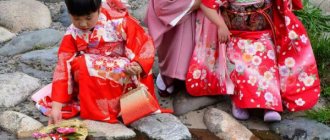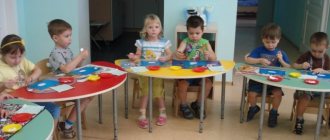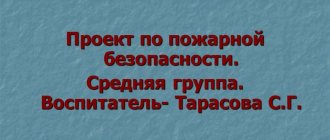MAGAZINE Preschooler.RF
“Cooperation between family and preschool educational institutions: traditions and innovations”WHAT ENTERED HIS MIND AND HEART FROM THE WORLD AROUND IT DECISIVELY DEPENDS ON WHAT PERSON TODAY’S CHILD WILL BECOME ON.
(Vasily Alexandrovich Sukhomlinsky)
Family is an integral part of society, which contributes to the formation of a harmonious personality.
It has a huge impact on the children who live in it. It helps you determine your moral guidelines. Despite the fact that in kindergartens, schools, sections and clubs, teachers strive to convey to the little person basic knowledge, skills, moral truths, and the experience of mom and dad, their attitude towards each other plays a major role in shaping the child’s personality.
Parents and grandparents lay down:
- ability to love;
- understanding your traditions;
- attitude towards people, including the opposite sex;
- the ability to appreciate help and provide it yourself;
- line of behavior in society and the ability to live harmoniously in it.
Only among loved ones and relatives does a person feel protected. He feels needed and this gives a person self-confidence. Helps him overcome difficulties and cope with failures.
The family is the beginning of everything, it is the connection between past generations and current ones. Each cell of society has characteristic features: the presence of marriage, children, maintaining a common household. It is where a person, his views, skills, and spiritual values are formed. And our task is to do everything to preserve it.
The family is a model for the formation of interpersonal relationships.
Family and kindergarten, school, traditional institutions for educating the younger generation, are always the focus of attention of science and society, which, as researchers note, is associated with the eternal problem of the collision of social and biological determinants. The UN Convention on the Rights of the Child (1989) recognizes the primary role of the family and parents in the care, education and protection of children. With the adoption of the Law of the Russian Federation “On the formation of the Federal State Educational Standard for Preschool Education” dated December 23, 2012 No. 273-FZ, the prerequisites arose for equal, creative, interested interaction between the family and the educational institution. The family, together with the educational institution, creates the most important set of factors and conditions of the educational environment, which determines the effectiveness of the entire educational process. On the one hand, there is a high need for cooperation between the two leading educational systems, the level of mutual demands of parents to the educational organization, teachers to parents has increased, at the same time, parental control over the educational process has increased, and the practice of involving parents in management (parents' council) is being formed. On the other hand, sometimes there is some alienation between parents and teachers. The problem of cooperation between family and educational organization is noted by many modern scientists and teachers, including the deputy scientific director of the National Research University Higher Preschool Educational Institution of Economics, Doctor of Economics Lev Lyubimov: “The role of parents today is one of the main failures of the kindergarten and preschool educational institution. Most people view educational institutions as storage facilities . There is an urgent need to update such an important area of activity of a general education institution - as the interaction of a preschool educational institution with the student’s family. [4; With. 53].
We assumed that an educational environment based on cooperation between family and preschool educational institutions will be successful if organizational and pedagogical conditions for cooperation are created that develop the educational potential of the preschool and family educational environment.
We believe that the main reasons for the problem of cooperation between families and preschool educational institutions are:
- pedagogical and psychological illiteracy of parents
- rigid parenting stereotypes
- personal characteristics of the parent and teacher brought into communication. Traditional education provided parents with the basics of psychological and pedagogical knowledge, but did not take into account the emotional and activity components, which undoubtedly reduced the quality of parental education. Modern pedagogy actively calls for the implementation of a competence-based approach in working with parents, which expands the scope of traditional education and aims the teacher at developing practical skills in parents, which consist in mastering various types of educational activities based on subject-subject relationships, characterized by trust, dialogical communication, focus on joint search for solutions to pedagogical problems.
In modern society, the relationship between family and educational organization in matters of personal development and education is gradually transforming into social partnership. The family begins to be active in integration, uniting into communities of fathers, mothers, and grandmothers, whose communication is facilitated by new information technologies. [1; With. 23].
A kindergarten teacher not only plays the role of an educator, but is also a partner of parents in raising children.
Working with parents is a complex and important part of the work of teachers. In our pedagogical practice, we are faced with such a problem as the interaction between the teacher and the family. Therefore, when working with parents, we use both traditional and non-traditional forms of cooperation.
Traditional forms:
- collective (parent meetings, conferences)
- individual (conversation, consultation)
- visual (open day, moving folders, stands, exhibitions).
Non-traditional forms:
- information and analytical (survey, test, questionnaire)
- leisure (holidays, exhibitions)
- educational (meeting in a non-traditional form, trainings, workshops, brainstorming)
- visual information (parents visiting preschool, watching videos)
In our work with parents, we use not only traditional forms of work, but non-traditional forms of interaction have proven themselves especially well, as they allow us to establish informal contact between parents and teachers.
Of the non-traditional forms, leisure activities in my work with my family turned out to be the most attractive, in demand and useful. During such events, positive emotional contact is established between the teacher, parents and children. My group annually hosts: holidays, entertainment, leisure activities dedicated to March 8, February 23, Family Day, etc., in which parents actively participate:
- sports entertainment “My dad is the best friend” ;
- leisure time for Mother's Day “My Dear Mommy” ;
- sports event for March 8 “Come on, mommies” ;
All these events take place within the walls of our institution: the sports and music hall, on the sports ground and simply on the site.
Parents expressed great interest in participating in the direct educational activities of the group, where they can independently prepare material on the topic, having previously discussed it with the teacher, and organize an interesting educational event for children. Such joint educational activities are very interesting for both parents and children. For example, we had an interesting event with my mother, . ”
Also, in our work with parents, we use such non-traditional forms of work as master classes, round tables, on a variety of topics, such as:
- round table “Boys and girls – two different worlds” ;
- master class “Sensory development and imagination of preschool children at home” ;
- master class “Volume paper snowflake” ;
- master class "New Year's crackers" .
Being in a group in a quiet, peaceful, non-formal environment, all parents can plunge into the world of childhood, feel like a child again and fulfill their unrealized childhood dreams by showing imagination and creativity. During master classes, parents can talk about their children, discuss with each other and with the teacher issues that interest them. [4; With. 36].
Thus, a modern preschool educational organization and family, combining their pedagogical potential, using new forms of collaboration based on social partnership, create a relevant educational space for the child.
Thus, of course, the preschool educational organization is assigned a coordinating role in organizing a system of cooperation with the student’s family. Recently, the teacher, the head of the preschool educational institution and parents are increasingly striving to work in a creative union. Their relationships become democratic, going beyond the “manager-subordinate” .
Preschool education as a public institution is designed to strengthen the educational potential and authority of the family by organizing productive pedagogical relationships with the parents of its students.
Bibliography
- “Development of the sphere of education and socialization in the Russian Federation in the medium term . Report of the expert group // “Education Issues” . – 2014. – No. 1. — P. 6-58.
- Strategy for the development of education in the Russian Federation for the period until 2025. URL: https://www. edu. ru/files/discussion/appeal. html (date of access: November 18, 2015).
- Popova M.N. Cooperation between family and preschool educational institutions as a pedagogical problem // Scientific opinion. Saint Petersburg. – 2015. – No. 4. — P.72-74.
- Prokopyeva M.M. System of social and pedagogical self-organization of the family: Author's abstract. dis. doc. ped. Sci. - Moscow, 2017. - 51 p.
- Sukhomlinsky V.A. The wisdom of parental love / Comp. A.I. Sukhomlinskaya. – M.: Young Guard, 2016. – 304 p. 6. Fadeeva E.I. Family and preschool educational institutions: developing cooperation. Toolkit. – M.: TC “Perspective” , 2015. – 112 p.
| Next > |




